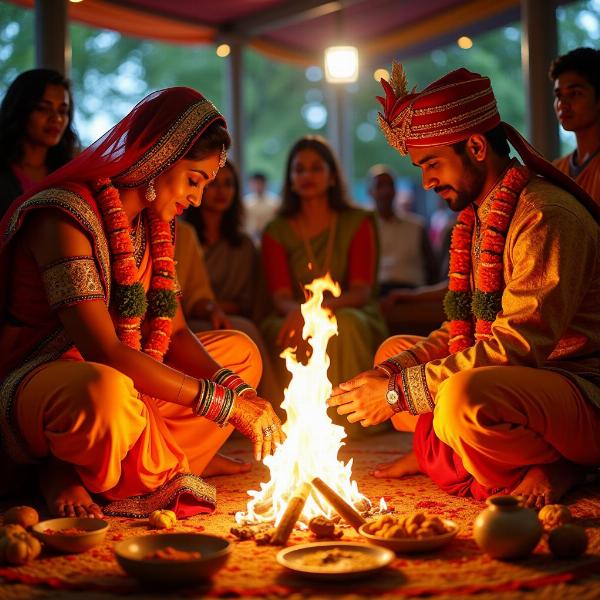The phrase “nuptial knot” evokes images of a sacred union, a lifelong commitment between two individuals. But what exactly does “nuptial knot meaning in hindi” signify? This article delves into the cultural and linguistic nuances of this term, exploring its significance in Indian traditions and offering a comprehensive understanding of its meaning. We’ll also explore related terms and customs associated with Indian weddings.
Unraveling the Meaning of “Nuptial Knot” in Hindi
The English phrase “nuptial knot” translates to “विवाह बंधन” (vivaah bandhan) in Hindi. “Vivaah” means marriage, while “bandhan” signifies a bond, tie, or connection. Therefore, “vivaah bandhan” literally translates to “marriage bond” or “matrimonial tie.” This term beautifully encapsulates the profound connection forged between two individuals during a wedding ceremony. It emphasizes the sacred and unbreakable nature of the relationship, often compared to a knot that binds two souls together for eternity.
 Vivaah Bandhan Ceremony
Vivaah Bandhan Ceremony
Significance in Indian Culture and Traditions
The concept of the nuptial knot holds immense significance in Indian culture, where marriage is considered a sacred sacrament (sanskara). It is not merely a social contract but a spiritual union that transcends lifetimes. The knot symbolizes the couple’s commitment to support each other through thick and thin, sharing joys and sorrows, and growing together on their life journey. It signifies the intertwining of two families, creating a strong social fabric.
The Seven Sacred Vows (Saptapadi)
The concept of the nuptial knot is deeply intertwined with the saptapadi, or seven vows, taken by the bride and groom during the Hindu wedding ceremony. These vows solidify the bond and outline the responsibilities and promises the couple makes to each other. These vows, taken while circling the sacred fire, are considered the foundation of the marriage. Each step represents a specific promise, such as mutual respect, support, and a lifelong commitment.
Beyond “Vivaah Bandhan”: Related Terms and Customs
While “vivaah bandhan” is the most direct translation of “nuptial knot,” other terms and customs further enrich the understanding of this concept. The mangalsutra, a sacred necklace tied by the groom around the bride’s neck, is a visible symbol of the marital bond. Similarly, the sindoor (vermilion powder) worn by married women on their foreheads signifies their marital status and the enduring nature of the nuptial knot.
What does tying the knot symbolize?
Tying the knot symbolizes the permanent bond between the couple, representing their commitment to face life’s challenges together. It is a visual representation of their intertwined destinies and the inseparable nature of their relationship.
How is the nuptial knot celebrated in different parts of India?
While the core concept remains consistent, the specific rituals and customs surrounding the nuptial knot may vary across different regions and communities in India. These variations reflect the rich diversity of Indian culture and add unique flavors to the celebration of marriage.
Conclusion: The Enduring Symbol of Commitment
“Nuptial knot meaning in hindi” encapsulates the profound significance of marriage in Indian culture. It goes beyond a simple ceremony, representing a lifelong commitment, a spiritual union, and the intertwining of two families. Understanding the cultural nuances of this term offers a deeper appreciation for the sacred bond it represents.
FAQ:
-
What is the literal translation of “nuptial knot” in Hindi? The literal translation is “vivaah bandhan,” meaning “marriage bond.”
-
What is the significance of the saptapadi in relation to the nuptial knot? The saptapadi, or seven vows, solidifies the nuptial knot, outlining the couple’s responsibilities and promises to each other.
-
What are some visible symbols of the nuptial knot in Indian culture? The mangalsutra and sindoor are visible symbols of the marital bond.
-
Does the celebration of the nuptial knot vary across India? Yes, specific rituals and customs may vary across different regions and communities, reflecting India’s cultural diversity.
-
Why is the nuptial knot considered sacred in Indian traditions? Marriage is considered a sacred sacrament, a spiritual union transcending lifetimes.
Meaning-Hindi.in offers expert translation services specializing in various domains, including legal, technical, and business documents. Our team of experienced linguists ensures accurate and culturally sensitive translations, catering to diverse needs. Contact us at contact@meaning-hindi.in or +91 11-4502-7584 for professional translation assistance. Meaning-Hindi.in is your trusted partner for bridging language barriers.